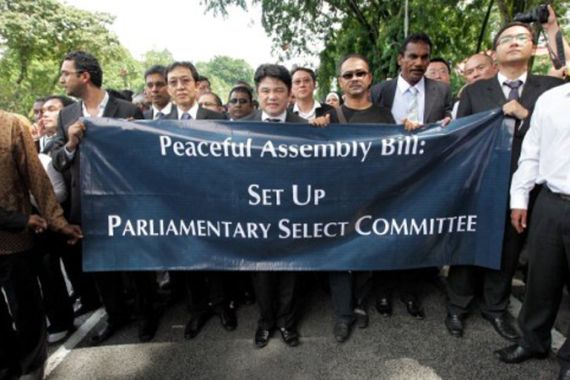Malaysia passes ban on street protests
Activist lawyers decry new law they say imposes tougher restrictions and penalties for demonstrators.

Malaysia’s lower house of parliament has approved a ban a on street protests after opposition legislators boycotted the vote and activists criticised the ban as repressive and a threat to freedom of public assembly.
The law is expected to be enforced after parliament’s upper house, also dominated by the ruling National Front coalition, approves it as early as next month.
Najib Razak, the country’s prime minister, has framed the bill as part of a campaign he launched in September to replace tough laws on security, speech and assembly in a bid to shore up support ahead of elections he is expected to call for next year.
He defended the act on Monday, saying it guarantees the right to peaceful assembly and said the law prohibits public marches to avoid disruptions to general society.
But it has been assailed by opposition politicians who call Najib’s reforms an election ploy, and say the bill validates their fears that tough old laws will merely be replaced by strict new rules.
Malaysian and international rights groups describe it as repressive because it bans street rallies and imposes tough restrictions and penalties for demonstrators.
The law was announced only last week, and some critics say the vote was rushed without proper public consultation.
About 500 lawyers and their supporters marched to parliament hours before the vote, urging lawmakers to reject the bill and chanting “freedom to the people” before police stopped most of them from entering the complex.
The new law would confine demonstrators mainly to stadiums and public halls. Depending on the venue, organisers may be required to give 10-day advance notification to police, who would determine whether the date and location are suitable.
Children under 15 and non-citizens would be barred from attending rallies, which also cannot be held near schools, hospitals, places of worship, airports or gasoline stations.
Demonstrators who break the law can be fined $6,200.
VK Liew, a deputy Cabinet minister in Najib’s office who received a protest note from the lawyers on Tuesday, suggested that critics should not be too quick to criticize the law.
“We should look at it holistically, not piecemeal,” Liew told reporters.
Opposition reaction
Anwar Ibrahim, the opposition leader, said he believed the Peaceful Assembly Act would be “more draconian” than laws in Zimbabwe or Myanmar.
Other opposition activists indicated they might challenge the law in court, insisting it breaches the people’s constitutional rights.
Amnesty International, the UK-based rights group, called the Peaceful Assembly Act “a legislative attack on Malaysians’ right to peaceful protest,” while Human Rights Watch said the law is being pushed through parliament with “undue haste”.
“The government must reject the bill as it infringes on the rights of the people and violates the constitution,” said Wong Chin Huat of Bersih 2.0, which spearheaded a rally for electoral reform in July that was broken up by police.
Lim Chee Wee, president of the Malaysian Bar Council, said the ban was “outrageous”.
“Assemblies in motion provide the demonstrators with a wider audience and greater visibility, in order for others to see and hear the cause or grievance giving rise to the gathering,” he said.
Critics including the Malaysian Bar Council and Human Rights Watch maintain the act would grant police too much power over the timing, duration, and location of gatherings.
“This bill is a legislative attack on Malaysians’ right to peaceful protest,” Sam Zarifi, Amnesty’s Asia-Pacific director, said in a statement.
The ruling Barisan Nasional coalition has been accused of routinely using tough laws to block challenges to its five decades in power.